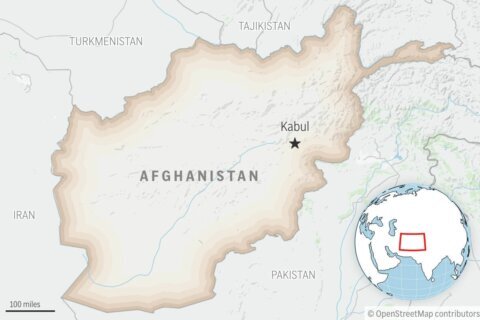Once a month during her two pregnancies, Winnipeg resident Wendy Zebrasky opened her mailbox to find a check for 81 Canadian dollars from the province of Manitoba.
The checks came care of a government program that gives low-income women a cash stipend during pregnancy, no requirements or strings attached. Zebrasky, a part-time receptionist, says the monthly check represented “a lot of money” that helped ease the stress of preparing for motherhood.
“I would just save (the money) at first because I thought I would need it when the baby came, but … after learning about the importance of eating healthy, I used the money to buy fruits and vegetables and those kind of things,” Zebrasky says. Her sons, now 2 and 4 years old, are “both very healthy; we haven’t had to go to doctors for anything, really.”
The financial cushion, which advocates say ensures low-income pregnant women have access to nutritious food and health care, is the key component of a Manitoba program that aims to reduce socioeconomic disparities in birth outcomes. The initiative has significantly reduced the share of women in Manitoba who have given birth to babies preterm or with low birth weight.
Researchers say the program offers a possible blueprint for communities across Canada and even in other countries to improve maternal and child health. While the stipend increases pregnant women’s spending power, its real value is drawing women who might delay seeking prenatal care into the health care system earlier in pregnancy, says the Rev. Tim Sale, who helped develop the program as a cabinet minister in Manitoba in the late 1990s and 2000s.
[ MORE: These countries are seen as the best for women.]
“The key goal here was not the money, because 80 bucks a month is not a lot of money,” Sale says. “To people who are poor, it’s a reasonable incentive. But the real incentive for us, the real goal was to get women, particularly at-risk women, into prenatal care as soon as possible. That’s the benefit it’s had.”
Since 2001, more than 63,000 low-income pregnant women in Manitoba have received the Healthy Baby Prenatal Benefit, a monthly stipend of up to CA$81.41 (about $62 in the U.S.) during their second and third trimesters of pregnancy, along with brochures about prenatal nutrition, breastfeeding and healthy infant development.
Women who receive the stipend also can join a community support program available during pregnancy and through the baby’s first birthday, though significantly more women have taken advantage of the cash benefit than the support program.
“Every time I see a pregnant mom, or one of my friends gets pregnant, I tell them about it,” Zebrasky says. “The benefit really helped a lot financially, and going to the program helped me become a confident mom. I learned a lot.”
Unlike some initiatives in the U.S. designed to provide extra help to low-income pregnant women, the only condition for the Manitoba benefit is tied to income level. There are no mandatory parenting classes or doctor’s appointments, no specific foods to buy and no other requirements on how to spend the money.
“We made it easy for them, as opposed to what most government grant programs are: full of red tape and bureaucrats pushing paper around and driving the programs nuts,” Sale says. His team drew inspiration from initiatives in France, which has earned a reputation for supporting pregnant women and new mothers and ranks among the best countries to raise children, according to the 2018 Best Countries survey, along with Canada and a handful of Scandinavian countries.
In lieu of strict spending requirements, Manitoba’s program administrators hope women will use the extra money for nutritious food or baby supplies. While other direct cash transfer programs have been tested in some developing countries, including Kenya and Cambodia, with promising results, Manitoba’s is the only program of its kind in either Canada or the U.S., says Marni Brownell, a research scientist at the Manitoba Centre for Health Policy.
“A lot (of the stipend) has to do with eating well, but some of it has to do with preparing for the baby,” Brownell says. “Some of the women used it to make rent. These are very low-income women, so it is reducing stress.”
Among nearly 10,000 women who received the stipend between 2003 and 2010, 67.2 percent initiated breastfeeding, 7.6 percent experienced preterm birth and 4.1 percent had babies with low birth weight, according to a study led by Brownell and published in the journal Health Affairs earlier this year.
Although outcomes for women who received the cash were worse than for women with higher incomes — who did not qualify for the stipend — they were better than the outcomes for low-income mothers who did not receive the benefit, “which demonstrates that the benefit helped reduce the equity gap in birth outcomes between low-income and higher-income women,” the report said.
Those disparities were pervasive despite the free prenatal care available to all expectant mothers through Canada’s universal health care system, indicating it takes more than theoretical access to care to ensure healthy pregnancies and births.
“Even though health care is free, (some women) feel like they’re poor or stigmatized in one way or another, and so they feel socially excluded and don’t look for health care,” Sale says. “It’s a bit of a hook, to have nurse a say, ‘How are you doing? Let’s take your weight, let’s take a look at how things are.’ It’s been a great way of getting folks into care appropriately.”
Women received more than CA$ 27 million through the program between 2001 and 2016, but Sale says the initiative has reaped much more in long-term savings. Health at birth has been linked to brain development and cognitive function, mental health and chronic disease risk.
“It’s cheap like borscht in terms of the cost of the program, given even a couple children a year with major birth defects as a result of poor nutrition or poor prenatal care (can be costly to treat),” Sale says. “We’re way ahead in every term — we’re way ahead on social benefit, and we’re way ahead on cost.”
In the U.S., the closest initiative is the federal earned income tax credit, says Milton Kotelchuck, a professor of pediatrics at Harvard Medical School and a senior scientist in maternal and child health at Massachusetts General Hospital.
Yet the prenatal benefit is “better than earned income tax credits, because it goes to everybody whether you work or not. It is means-tested, so you have to be poor to get it, but you don’t have to have worked,” Kotelchuck says. That ensures money is still accessible to “the really poorest people,” including family caregivers and indigenous populations who may not hold traditional jobs.
A more direct American program is the Women, Infants and Children program, or WIC, which provides vouchers for fruits and vegetables for low-income pregnant women, new mothers and young children who have a nutritional need. Income eligibility guidelines require households to fall within 185 percent of the federal poverty line, or earn no more than $46,435 for a family of four.
“They are ways in which you change the economic well-being of the family,” Kotelchuck says of both WIC and Manitoba’s prenatal benefit. But WIC is more “prescriptive of what parents could do … (while) allowing parents to use the money in the way that best maximizes things for their families is really the best way to do it.”
“It’s really what we need in America for helping young families, many of whom are facing all kinds of economic threats and pressures on them,” he says. “The poorest time in a family’s life is right when they first begin to have kids.”
Though Kotelchuck says U.S. states or communities could try to implement unconditional programs like Manitoba’s, it isn’t politically viable at the federal level because “the Trump administration is not pushing to expand social welfare benefits,” and “the first item on everybody’s agenda is paid parental and medical leave.”
Any effort to explore such a program in the U.S. would likely trigger debates over whether parents would spend the money wisely. In Manitoba, researchers say that although directly giving cash makes tracking parents’ spending difficult, they generally have spent the money as intended.
“There’s probably a tiny minority who abuse it, but they would figure out how to abuse vouchers too, I’m sure,” Sale says. “I think you don’t build a system based on the minority that do badly, you build a system based on the majority, and you try to help the folks who don’t use it properly.”
There is some evidence in support of Sale’s view. In Cambodia, a UNICEF-funded pilot allocated $51 per month to pregnant women and new mothers if they attended prenatal checkups, vaccinated young children, attended nutrition education classes and met other requirements. Most said they used the money on food and reported better understanding of healthy food and cleanliness. There was no evidence families spent the money on “adverse items” such as alcohol or tobacco.
“I also believe — although I don’t have the hard data to prove this — that saying to these women, ‘We trust you to do the right thing,’ must be worth something in terms of health outcomes and stress,” Brownell says.
[ MORE: Canada is viewed as country offering the best quality of life.]
With the Manitoba program now 17 years old, researchers are seeking to evaluate the health of teenagers whose mothers received the benefit, Brownell says. Her team also plans to measure whether the health effects of the benefit have slowed in recent years, as the cost of living has increased while the supplement amount has stayed the same.
“We all know the cost of food and the cost of everything else has changed,” Brownell says. “I think we can guess that $81 doesn’t go quite as far as it used to.”
More from U.S. News
These Are the 5 Best Countries for Women
Detroit Looks to Curb Infant Mortality Through Community Partnerships
U.S. Has Highest Child Mortality Rate of 20 Rich Countries
Canadian Program Aims to Boost Birth Outcomes for Low-Income Women originally appeared on usnews.com






